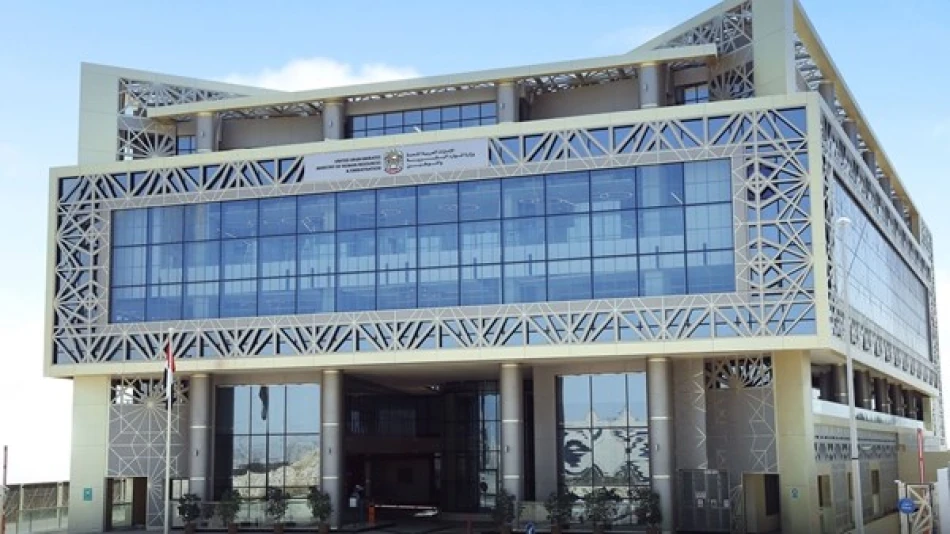
HR and Localization Authority Processes 18M Smart Transactions in H1
UAE's Digital Labor Revolution: 18 Million Smart Transactions Signal Government's AI-First Future
The UAE Ministry of Human Resources and Emiratisation processed over 18 million digital transactions in the first half of 2025, demonstrating how the nation is transforming government services through artificial intelligence and smart technology. This massive digital shift positions the UAE as a global leader in labor market innovation while advancing its ambitious "We the UAE 2031" vision to become the world's most prosperous society.
Digital Transformation at Scale
The 18 million transaction milestone reflects more than just technological capability—it represents a fundamental reimagining of how governments can serve citizens and businesses. The UAE's approach integrates AI across all operational phases, creating what officials describe as predictive services that anticipate user needs rather than simply responding to them.
This volume of digital transactions in just six months suggests the UAE is processing roughly 100,000 labor-related transactions daily through smart channels. For context, this rivals the digital government capabilities of established tech-forward nations like Estonia and Singapore, but at a much larger scale given the UAE's economic complexity and expatriate workforce.
Beyond Basic Digitization
Unlike many countries that simply moved paper processes online, the UAE is leveraging AI to create entirely new service models. The ministry has deployed over 100 smart services across its website and mobile applications, focusing on instant processing and document reduction—key factors that matter to businesses operating in fast-paced markets.
Strategic Economic Implications
This digital infrastructure development directly supports the UAE's broader economic strategy. As the nation positions itself as a global hub for the "new economy"—encompassing fintech, AI, and digital services—efficient labor market operations become critical competitive advantages.
For businesses and investors, these smart services reduce operational friction significantly. Companies can process work permits, visa applications, and compliance requirements in real-time rather than waiting weeks for bureaucratic approvals. This efficiency translates directly into reduced costs and faster market entry for international businesses considering UAE expansion.
Regional Leadership Context
The UAE's approach contrasts sharply with regional neighbors who remain heavily dependent on manual processes. While Saudi Arabia's Vision 2030 includes similar digital government goals, the UAE's execution speed and scale demonstrate practical implementation rather than aspirational planning.
This digital leadership reinforces the UAE's position as the Middle East's business hub, particularly as companies increasingly factor government efficiency into location decisions for regional headquarters.
The Zero Bureaucracy Challenge
The ministry's achievements directly support the UAE's ambitious "Zero Bureaucracy Program," which aims to eliminate administrative inefficiencies across government. Processing 18 million transactions digitally represents significant progress toward this goal, but the real test lies in maintaining service quality while scaling further.
The integration of AI-powered systems suggests the UAE is building sustainable solutions rather than quick fixes. By training human resources to work alongside advanced technology, the ministry is creating a hybrid model that combines technological efficiency with human oversight—crucial for handling complex labor market scenarios.
Future Implications for Labor Markets
This digital transformation extends beyond administrative efficiency to reshape how the UAE manages its diverse workforce. With over 200 nationalities working in the Emirates, smart systems that can handle multiple languages, regulations, and compliance requirements become essential infrastructure.
The ministry's focus on predictive services could revolutionize workforce planning. AI systems analyzing 18 million transactions can identify labor market trends, skill gaps, and economic shifts in real-time, enabling more responsive policy-making.
For global observers, the UAE's approach offers a blueprint for how mid-sized economies can leverage technology to compete with larger nations. By focusing on service excellence and digital innovation, the UAE is creating competitive advantages that transcend traditional economic metrics like population size or natural resources.
The Competitive Edge
As other nations struggle with post-pandemic government modernization, the UAE's proven ability to process massive transaction volumes through smart systems provides tangible evidence of successful digital transformation. This operational capability becomes increasingly valuable as global business demands faster, more reliable government services.
The 18 million transaction milestone represents more than administrative success—it demonstrates how strategic technology investment can transform government effectiveness and economic competitiveness simultaneously.
Most Viewed News

 Layla Al Mansoori
Layla Al Mansoori






